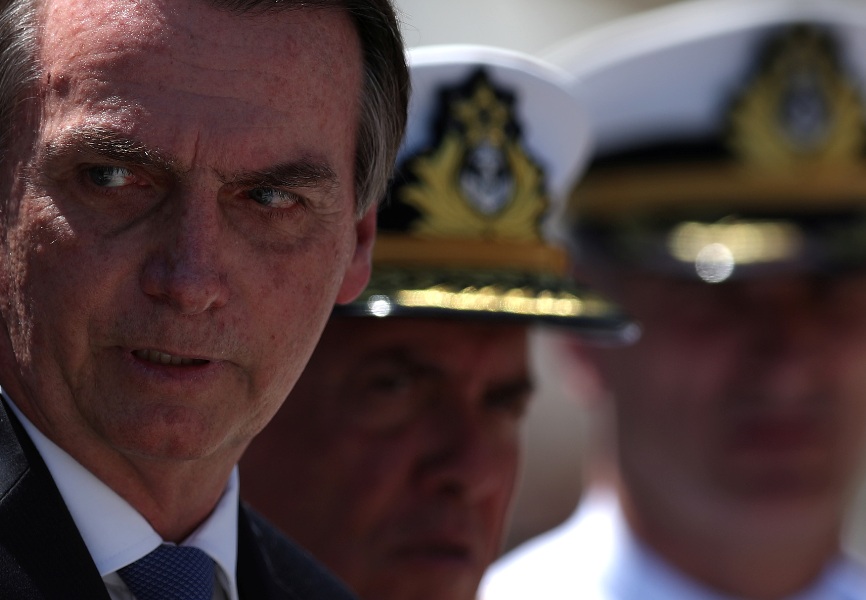Brazilian President Jair Bolsonaro's political standing has been weakened by a poor response to the coronavirus outbreak and ongoing investigations into his inner circle. This trend will continue, further polarizing the country's political landscape as it emerges from the pandemic. Despite the dysfunction, the odds of a democratic breakdown remain low. As Eurasia Group expert Chris Garman explains, Brazil's institutions and checks on executive authority remain strong.
Deepening polarization
It would be an understatement to say Covid-19 has exacerbated the polarization in
Brazil's political landscape. Bolsonaro has faced sharp criticism for his vigorous stance against social distancing to combat Covid-19, while investigations into his inner circle have inflamed tensions with federal police and the courts.
Even with these challenges, the president's message continues to resonate with more than one-third of the population. His approval ratings have fallen modestly and will likely drop further as the economic fallout mounts and the peak of the pandemic approaches, but Bolsonaro's support is unlikely to collapse given a loyal and vocal base.
The next shoe to drop will likely be growing street protests. Despite anti-Bolsonaro groups urging the public to stay home, both anti- and pro-Bolsonaro rallies were held in major state capitals over the past few weeks. As concerns over the pandemic wane, these demonstrations will probably gain steam, and unlike street protests between 2013 and 2016, these will be characterized by a more even balance between supporters and opponents of the president.
No signs of a democratic breakdown
Concerns that this environment will spark a democratic breakdown are understandable given the military's large presence in the government and inflammatory rhetoric coming from the president and his cabinet. But these fears are overblown.
Brazil's modern military was molded by the difficult transition from dictatorship to democracy in the 1980s and would not support any effort to shut down congress or the courts. Though heavily invested in the Bolsonaro administration's success, there are clear limits to how far that backing will go. There is also a growing schism between active duty generals and the reserve officers in Bolsonaro's cabinet, with members of the cabinet ardently defending the administration while generals outside the administration express concern with the military's growing involvement in politics.
Bolsonaro was elected on an antiestablishment platform that tapped into deep public disenchantment with institutions such as congress, courts, and the media. His decision to continue with his provocative rhetoric while in government has generated considerable animosity with these institutions; until this year, he neglected to even attempt creating a congressional working majority.
The unintended consequence has been a
weakening of the executive. This began in 2019, with congress's approval of two constitutional amendments that curtailed executive discretion over the budget. It accelerated with the president's controversial response to Covid-19. The Federal Supreme Court ruled that state and local governments have complete prerogatives in managing shutdowns, in addition to barring the president's nomination of a federal police head over fears he would obstruct ongoing investigations.
Bolsonaro's team believes the “establishment” is bending constitutional principles to sabotage his administration. Veiled threats from cabinet members with a military background against courts must be taken in context; from these officials' perspective, the courts' overtures are designed to unduly weaken the executive office. The media, courts, and occasionally congress are in turn reacting to a president who uses inflammatory rhetoric against them to mobilize a base that distrusts them all. Rather than a threat to democracy, Brazil is facing a polarized standoff between branches of government.
Further strain possible
The quality and robustness of Brazil's institutions are certainly at play in this standoff. If the president opts to simply disregard a court decision he views as judicial overreach, it could create a real crisis that could weaken the credibility of the courts. This would represent a real challenge, and members of the courts will be careful to avoid it. Still, it would not represent democracy's collapse. If Bolsonaro disrespected a court order, a systematic response would kick into gear, with the president potentially facing charges for disobedience, followed by a vote in congress's lower house.
Headlines questioning the integrity of Brazilian democracy overlook the reason such tensions are arising in the first place. In contrast to other emerging market democracies, Bolsonaro cannot control constitutionally independent prosecutors, courts, or even his own federal police. Congress will not give the president a blank check, and Brazil's media remains active and independent. In many other democracies without these checks, a president with Bolsonaro's antiestablishment credentials would have freer reign. In Brazil, he does not. Polarization is deteriorating Brazil's political discourse, and the strength of democratic institutions is in play. But the country's democratic order will not be undermined, and the only reason they are being strained is precisely because the executive office has so many checks on its powers.
Learn more:

 Brazilian President Jair Bolsonaro attends a ceremony celebrating the 211th anniversary of the Brazilian Marine Corps. REUTERS.
Brazilian President Jair Bolsonaro attends a ceremony celebrating the 211th anniversary of the Brazilian Marine Corps. REUTERS.
